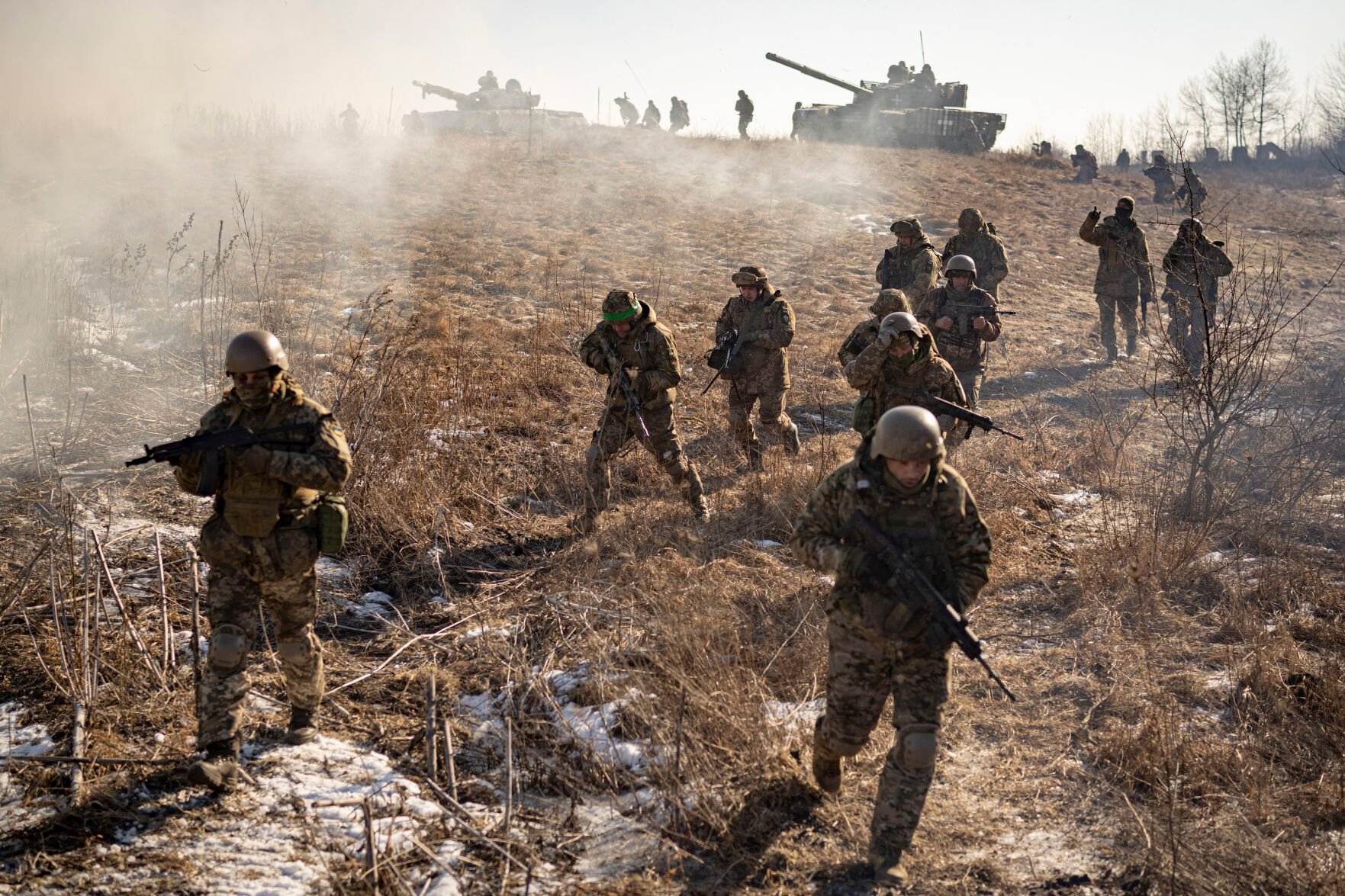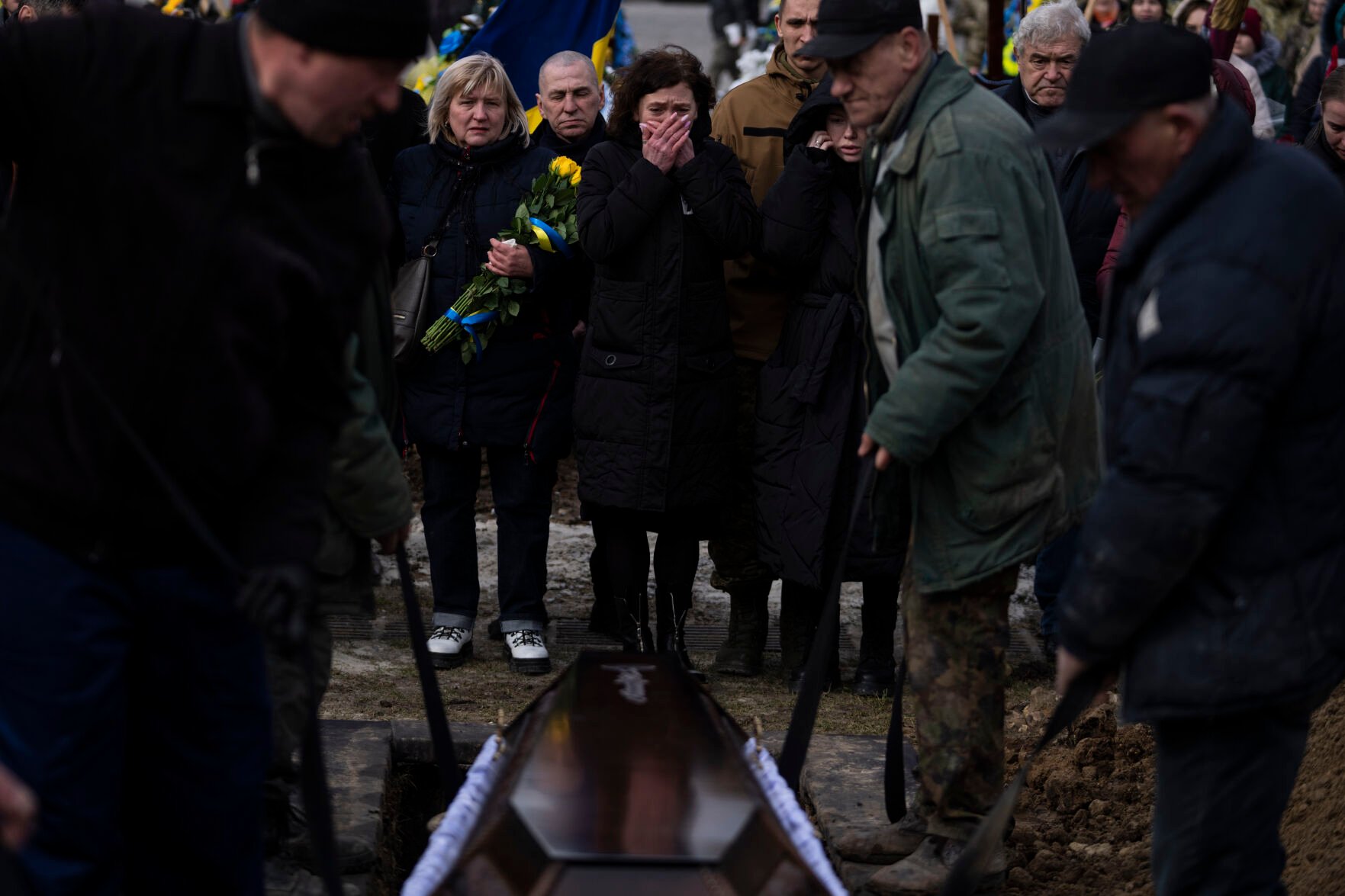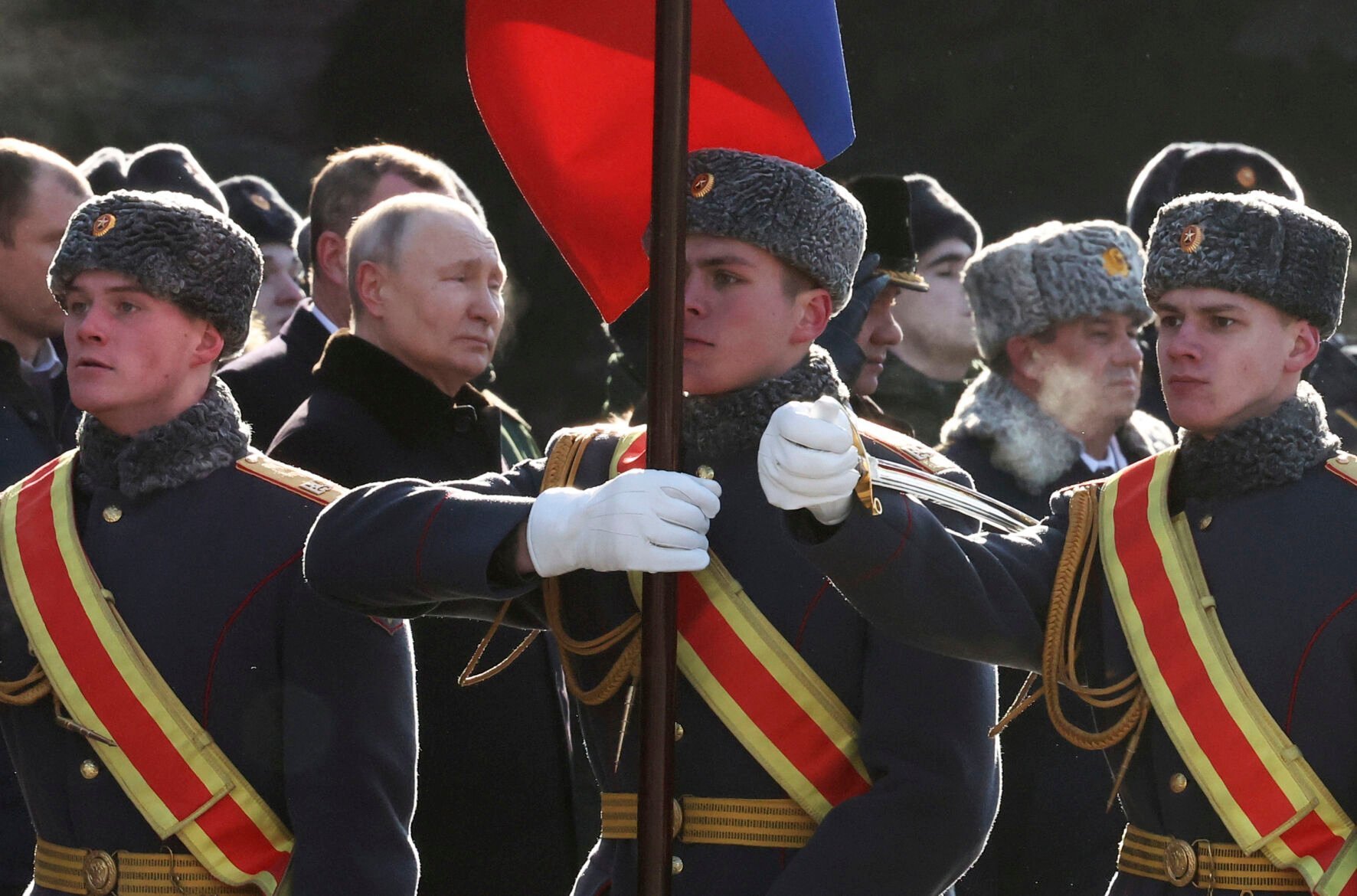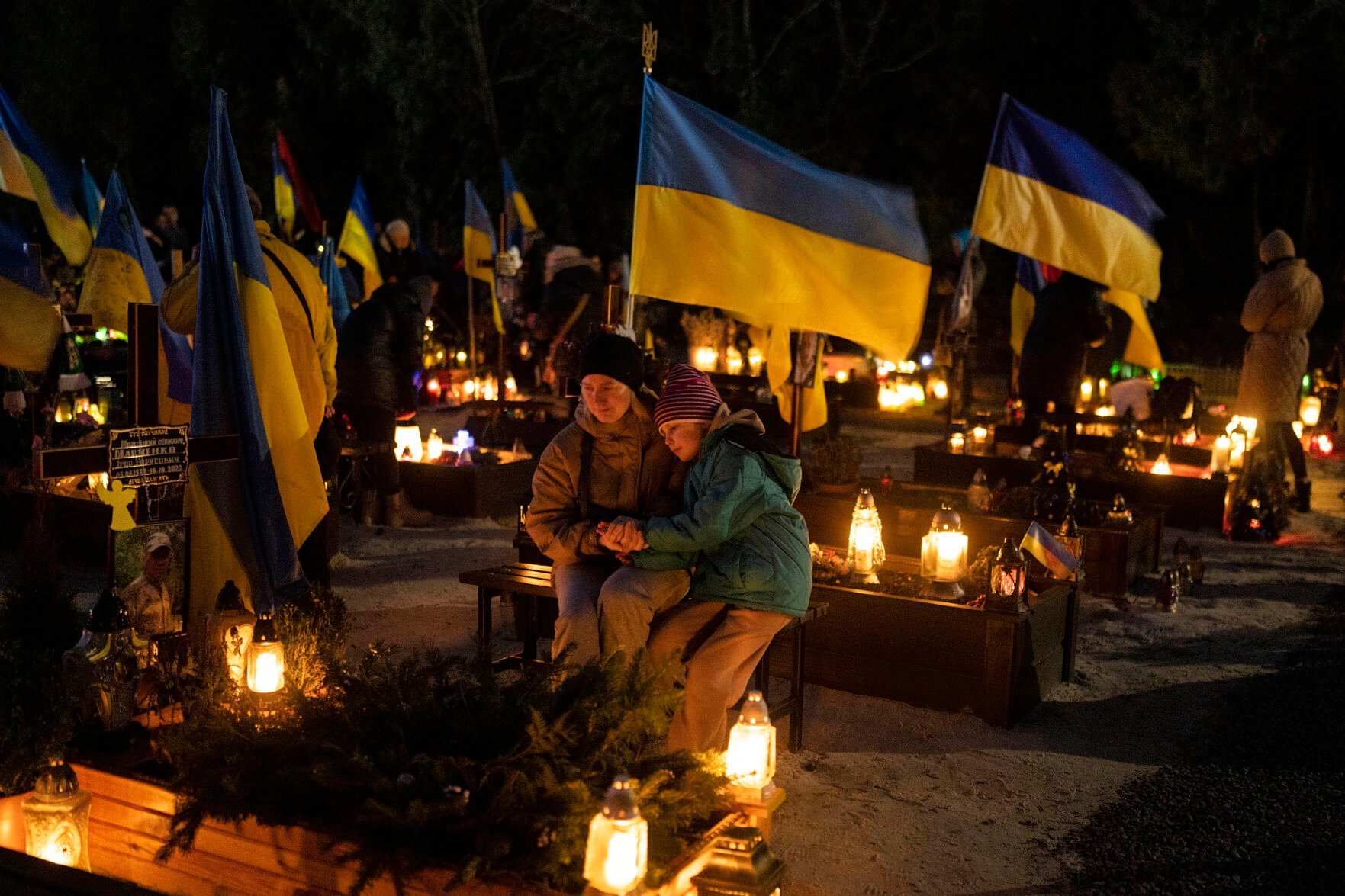In Russia-Ukraine war, more disastrous path could lie ahead
For Russia, it’s been a year of bold charges and bombardments, humiliating retreats and grinding sieges. Ukraine countered with fierce resistance, surprising counteroffensives and unexpected hit-and-run strikes.
Now, on the anniversary of Russia’s Feb. 24, 2022, invasion that has killed tens of thousands and reduced cities to ruins, both sides are preparing for a potentially more disastrous phase.
Russia on Thursday intensified its push to capture all of Ukraine’s eastern industrial heartland of the Donbas. Kyiv and its Western allies also say Moscow could try to launch a wider, more ambitious attack elsewhere along the more than 600-mile front line.
Ukraine is waiting for battle tanks and other new weapons pledged by the West for it to reclaim occupied areas.

Vadim Ghirda, Associated Press
Ukrainian servicemen of the 3rd Separate Tank Iron Brigde take part in an exercise Thursday in the Kharkiv area, Ukraine.
What’s nowhere in sight is a settlement. The Kremlin insists it must include the recognition of the Crimean Peninsula, which it annexed illegally in 2014, along with the acceptance of its other territorial gains. Ukraine categorically rejects those demands and rules out talks until Russia withdraws all forces.
The U.N. General Assembly approved a resolution Thursday that calls for Russia to end hostilities and withdraw its forces, sending a strong message on the eve of the first anniversary of the invasion that Moscow’s aggression must end. The 141-7 vote with 32 abstentions was slightly below the highest vote for the five previous resolutions approved by the 193-member world body regarding the war.
The resolutions are not legally binding but serve as a barometer of world opinion. The Security Council, charged with maintaining international peace and security, is paralyzed by Russia’s veto power.
Foreign ministers and diplomats from more than 75 countries addressed the assembly during two days of debate, many urging support for the resolution that upholds Ukraine’s territorial integrity, a basic principle of the U.N. Charter that all countries must subscribe to when they join.
Meanwhile, China called for a cease-fire early Friday between Ukraine and Russia and the opening of peace talks as part of a 12-point proposal to end the conflict.
The plan by the Foreign Ministry also urges the end of Western sanctions imposed on Russia, the establishment of humanitarian corridors for the evacuation of civilians and steps to ensure the export of grain after disruptions caused global food prices to spike.

Petros Giannakouris, Associated Press
Kateryna, center, the mother of 32-year-old soldier Denys Averiiev reacts Thursday during the funeral of her son at Lviv cemetery in western Ukraine. Averiiev died in Bakhmut on Feb. 16.
The U.S. wants to see tougher and more effectively enforced sanctions against Russia and additional support for Ukraine, Treasury Secretary Janet Yellen said Thursday during meetings of the Group of 20 leading economies in the Indian technology hub of Bengaluru. She said sanctions are working but more needs to be done to hobble the Russian war effort.
Yellen said the U.S. expects to provide another $10 billion in assistance to Ukraine on top of more than $46 billion already given. She commended allies for their direct aid and said the role of the International Monetary Fund in those efforts is “critical.”
Experts warn that Europe’s largest conflict since World War II could drag on for years, and some fear it could lead to a direct confrontation between Russia and NATO. Putin repeatedly said Russia could use “all available means” to protect its territory, a clear reference to its nuclear arsenal.
In recent months, Russian forces have tried to encircle the Ukrainian stronghold of Bakhmut and push deeper into the Donetsk region. Moscow also aims to wear down Ukrainian forces and prevent them from starting offensives elsewhere.
“Russia currently has the initiative and the advantage on the battlefield,” Ukrainian military analyst Oleh Zhdanov said, noting Kyiv’s acute shortage of ammunition.
Russia has relied on its massive arsenal, and boosted production of weapons and munitions, giving it a significant edge. While Ukrainian and Western intelligence agencies observed that Moscow is running out of precision missiles, it has plenty of old-style weapons.
Still, a wider Russian offensive beyond the Donbas could be a gamble for Moscow, which mobilized 300,000 reservists last fall to bolster its forces.

Valeriy Sharifulin, Sputnik, Kremlin Pool Photo
Russian President Vladimir Putin attends a wreath-laying ceremony Thursday at the Unknown Soldier's Grave in the Alexander Garden during the national celebrations of the "Defender of the Fatherland Day" in Moscow.
Igor Strelkov, a former Russian security officer who led separatist forces in the Donbas when fighting erupted there in 2014, warned that a big offensive could be disastrous for Russia because its preparation would be impossible to conceal and attackers would face a devastating response. He said an offensive would also raise logistical challenges like those that thwarted Russia’s attempt to capture Kyiv at the war’s start.
“Any large-scale offensive will quickly and inevitably entail very big losses, exhausting the resources accumulated during mobilization,” Strelkov warned.
Justin Bronk, a senior research fellow at RUSI in London, predicted a Russian offensive would fail but said it could drain Ukraine’s resources and keep it from preparing a large-scale counteroffensive.

Petros Giannakouris, Associated Press
Olesia and her 8-year-old daughter Uliana sit next to the grave of Olesia's husband, Ihor Marchenko, on Thursday at Lviv cemetery in western Ukraine for a "lights of memory" event to honor those who died fighting against the Russian invasion.
Major Ukrainian battlefield successes this summer could fuel “significant political turmoil in Russia, because at that point, Putin’s own position within the leadership becomes very, very difficult to see as tenable,” he said.
At the same time, if Ukraine fails to reclaim more territory before Russia builds up its troops, it could lead to a “long-term stalemate and sort of a grinding attritional war that just kind of goes on and on,” Bronk added.
Fiona Hill, a senior fellow at the Brookings Institution who served in the past three U.S. administrations, said Putin is hoping for Western support for Kyiv to dissolve — “that it goes away and that Ukraine is left exposed, and then that Russia can force Ukraine to capitulate and give up on its territory.”
